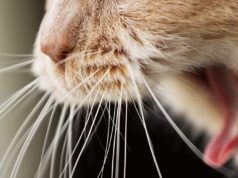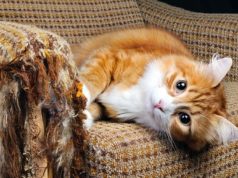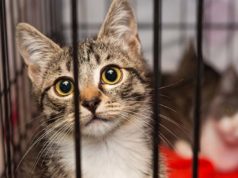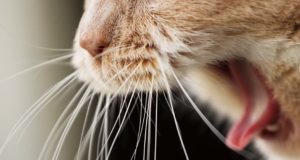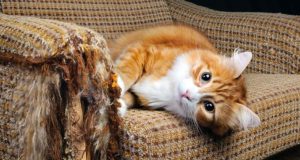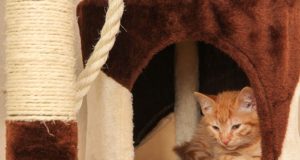The Exotic Shorthair cat breed, or just the Exotic for short, is officially the most popular cat breed in the United States, edging out breeds like the Persian and Maine Coon.
With a very distinguishable face that’s birthed an endless array of interne memes, a calm and gentle personality, friendly, curious and playful – the Exotic cat is a great apartment and lap cat for any owner.
READ ALSO: Top 10 Best Cat Trees for Home
Exotic Cat Breed Information
Everything Future and Current Owners Must Know
General Exotic Cat Breed Questions
Here are some of the most common questions about the Exotic cat breed that most future and current cat owners may be curious about.
1. That’s a very weird-looking face. Is the Exotic breed artificially created?
Yes. In fact, the Exotic Shorthair is very closely related to the Persian cat, which is where it gets its flat muzzle. The Exotic is a mix between Persian and American Shorthair cats.
2. Persian cats are a longhaired breed – doesn’t this affect the Exotic Shorthair in any way?
When it comes to relation to Persian cats, actually, when breeding, two Exotic Shorthair cats have a 25% chance for each offspring to be longhaired, thanks to a recessive longhaired gene that the Exotic still carries.
Such Exotic longhaired offspring is identified differently by different organizations – the CFA (Cat Fanciers’ Association) doesn’t recognize them as Persians and still counts them as Exotic Shorthairs, TICA (The International Cat Association) accepts them as Persian cats birthed by two Exotic parents, and ACFA (American Ca Fanciers Association) registers them as a separate Exotic Longhair breed.
3. So, the Exotic and the Persian cats are very closely related. Does that mean that their behavior is similar as well?
Quite so, yes. The Exotic Shorthair is a calm and gentle cat, very much like their Persian cousins. Yet, thanks to their streak of American Shorthair cat, they are also a bit livelier than Persian cats – a bit more playful and energetic, although not too much.
History of Exotic Cat Breed
With the general questions about the Exotic cat breed out of the way, some pet owners are often curious about the history of this breed of cat. Here’s what to know.
1. If the Exotic is a mix between Persians and American Shorthair cats that would make them a very new breed, right?
Indeed. The Exotic Shorthair breed was developed in the late 1950s. Initially, it wasn’t intended as a separate breed, but simply as an improvement of the American Shorthair – some breeders at the time felt that the American Shorthair (ASH) needed a better body type.
The cross with the Persian was done in secret, and simultaneously ASH was also crossed with Russian Blue and Burmese cats with the same goal in mind. The cross with the Persian breed proved to be the most successful one, however, it was also clearly different than the standard ASH breed.
This led to a lot of ASH breeders setting breed standards that disqualified crossbred ASH cats from competitions and pet shows. The next several years were a period of turmoil in the ASH breeders’ community, but eventually American Shorthair breeder Jane Martinke recognized the ASH/Persian crossbreed as an entirely new breed in 1966. It was then that the breed was named “Exotic Shorthair”.
A couple of decades later in 1987 the CFA decided that the Exotic breed is to be crossed only with Persian and Himalayan breeds, and not to other shorthair cats. This was done because the Exotic cats are much closer related to Persians in particular, than they are to their shorthair ancestors.
2. How did such a new and weird breed become one of the most, if not the most, popular breed of cats?
Largely because of its physical weirdness, coupled with the breed’s great personality. There wasn’t one single event in their short history that sparked their fame – the Exotic just gradually won people’s hearts, supported by the many advocates of the breed.
Personality of Exotic Cat Breed
Here are a few things that pet owners need to know about the personality of Exotic cat breeds, because they certainly differ from many other domesticated cats.
1. So, the Exotic Shorthair is just a more playful Persian cat with shorter hair?
Simply put, yes, but that’d be an understatement for the breed’s charming personality. Like the Persian, the Exotic cat is calm and docile, usually quiet, unless it really wants something, and when it does – it asks for it with a soft, pleasant voice.
Unlike the Persians, however, the Exotic Shorthair cat is quite more playful – it loves to play with toys, as well as to chase you and run around the apartment. It’s much more curious by nature and enjoys exploring.
While it’s still a long way away from being too mischievous like other cat breeds (your curtains will most likely still be safe with an Exotic cat), the Exotic definitely likes checking out everything new, enjoys watching you do your thing and will often times volunteer to take part in it too.
Or in other words, while the Exotic’s calm personality makes it a great lap cat, you would be mistaken to think that it’s just an ornament for your apartment – if you get an Exotic cat, you’d be getting a playful and curious companion that enjoys spending as much time with you as possible.
2. How do I ensure that my cat grows up into the perfect pet?
Cats’ personality is not as dependent on our training as dogs’ – cats are not as easy to mold to our preferences.
Still, as with all pets, the way we care for them, training them, and socialize them, shapes them to a large extend. Here are the 3 pillars of a cat’s personality:
1. Parents. A lot of people prefer to get old cats in order to make sure that they see what the cat’s personality is. With a kitty you never know what they’ll grow up into. There are some things that can help you get an idea, however – check out the kitty’s mother, as well as its father and other siblings – what are their personalities? Also, when presented with an entire litter, it’s advisable to go for a kitty that’s neither overly active nor extroverted, nor one that’s too shy and excluded – pick a kitty that seems as “normal” as possible, compared to its siblings if you want it to grow into a cat that has a nice and balanced personality.
2. Training. Cats may not need as much training as dogs, but they still require a hefty amount of it. Exotics, in particular, are quite a curious and playful breed that is always happy to play new games and learn new tricks. As proficient mousers, for example, they enjoy playing fetch, but they need to be taught and trained first. When training your Exotic cat, always make sure to use positive reinforcement – never hit or punish your cat, as it will only have a negative effect on its trust towards you and as a result – its obedience. Instead, youse treats, kind words, petting, and other rewards to teach your Exotic on how exactly it needs to act and behave.
3. Socialization. Exotics are a very friendly cat breed, especially compared to most others – they enjoy people’s company, as well as to make friends. They are still cats, however, and if they are not taught to trust strangers, they can become very weary of them. For that reason it is of utmost importance that you socialize your Exotic cat from the earliest age. That doesn’t mean forcing it out for a walk to the dog park, but to instead just have people over from time to time – this way the cat will learn that strangers and newcomers are not something to be feared, and it will greet them with joy, or at the very least – without fear. This way you can make sure that you’ll save a lot of stress for your cat later down the line, and that your cat will be a great pet around guests.
Health of Exotic Cat Breed
One of the most important parts to cover is the health of Exotic cat breed.
1. If the Exotic cat is such a new breed, and if it is artificially created, does that mean that it is prone to more illnesses and other physical disorders, compared to other house cats?
Despite being a very new breed, the Exotic cat is not as prone to diseases and disorders as one might think. That is thanks to the many precautions that the breed’s original breeders took when crossing Persian American Shorthair cats. Still, it’s a living breathing animal, and as such, it has a risk of getting some diseases or genetic abnormalities.
Additionally, since it’s a short-nosed cat like its Persian cousins, the Exotic is a brachycephalous breed which means that it’s prone to some problems related to having its nose and eyes in a close proximity to each other.
Another consequence of that can be problems with the tear ducts and sinuses, and because of the relatively short jaw, tooth misalignment or tooth crowding is possible as well.
Here are some of the more common health problems you should be on the lookout for:
- Brachycephalic airway syndrome (BAS) – Breathing difficulties that are a result of the breed’s constricted nostrils. Also referred to as brachycephalic respiratory syndrome or congenital obstructive upper airway disease.
- Dental malocclusions – The breed’s teeth sometimes don’t mesh well with each other, due to the small jaw of Exotic cats.
- Calcium Oxalate Urolithiasis – A stone that crystallizes in the bladder and kidney.
- Excessive tearing.
- Eye conditions such as cherry eye and entropion.
- Dystocia – Due to the breed’s large and round skull shape, abnormal labor difficulties are possible.
- Seborrhea oleosa – A skin condition that causes itchiness, redness and hair loss.
- Heat sensitivity.
- Ringworms – A fungal infection.
- Feline polycystic kidney disease (PKD) – PKD is a disease that has a high chance of leading to kidney failure. DNA screening for PKD is recommended for all Exotic cats.
2. What should I do to guarantee the best possible health for my cat?
Whenever you decide to get an Exotic or other cat, always consult with the Pet Professional Guild and the CFA first on finding a professional breeder.
Such a breeder is needed, because he/she will provide you with health clearances for the cat’s parents and make sure that it is free of any genetic diseases. Getting a cat from anywhere else without such health clearances is nothing less than lottery.
Once you get your new Exotic best friend, make sure you find a good veterinarian, that’s open 24/7 and talk with them regularly on everything concerning your cat’s health.
Care of Exotic Cat Breed
Caring for Exotic cat breed is similar to your regular cat care of other domesticated cats, but there are a few things that pet owners should know.
1. Since the Exotic Shorthair cat doesn’t have the Persian’s extensive coat, it should be much easier to take care of, right?
Correct. The Exotic Shorthair is called “Lazy man’s Persian” for a reason. The cat will most likely be able to keep its short coat in great condition almost by itself, especially if you keep your apartment clean and don’t let it out.
Still, combing the cat’s hair once or twice a week is recommended, to help getting rid of dead hair and preventing hair balls. Plus, you can teach your cat to like your grooming, so it can be fun for the both of you. A monthly bath is not a bad idea either.
2. Aside from the cat’s coat, what else should I take care of?
Here are some basic things you should keep in mind:
- As a short nosed brachycephalous breed, the Exotic cat is prone to tearing. Make sure to daily wipe your cat’s eyes with clean moisturized tissues (don’t use one tissue for both eyes – you’ll risk spreading an infection if there is one). This will prevent under-eye tear stains and dampening.
- It’s also strongly advisable to brush your cat’s teeth daily to prevent the development of periodontal disease. If you don’t have the patience for daily brushing, make sure to do it at least once per week.
- Also make sure to regularly clean your cat’s ears.
- It’s not recommended to let your Exotic cat outside. Exotics are a strictly indoors breed. While they are decent mousers, they are not good scrappers, so they won’t fare well against other cats and dogs outside. Their medium size and weight of 7 to 12 pounds won’t help them either.
3. How should I feed my Exotic cat?
The Exotic doesn’t have a very specific set of diet preferences, although, like their Persian brethren they can be a bit picky eaters. Make sure to feed them with a high-quality food with a significant meat content, as well as to alternate wet and dry food.
If you’re not grooming your cat regularly, a food that helps with hairballs can be advisable, and if you’re not brushing its teeth every day, a dry food that’s designed to help cats’ teeth is a good idea as well. Outside of that, as long as you don’t overfeed or starve your Exotic cat, everything should be in order.
Children and Other Pets for Exotic Cat Breeds
 Finally, how does the Exotic cat breed deal with other pets, animals and in particular children? For any family with kids or dogs wanting to adopt this breed, note the below.
Finally, how does the Exotic cat breed deal with other pets, animals and in particular children? For any family with kids or dogs wanting to adopt this breed, note the below.
1. Is the Exotic breed suitable for a household with small children in it?
The Exotic cat is a very friendly breed that’s comfortable both in environments with a lot of playtime, and with more calm and passive owners.
That being said, every Exotic cat will be happy to be in a home with small and playful children that will give it the time of day for playing and petting.
However, it is important to teach your children to play well with your cat and not torment it – as long as the kids are well-mannered and respectful towards the cat’s fragile physique, any Exotic will be happy to play with them.
2. How about other pets? How will an Exotic cat fare with another cat or a dog?
Being a friendly breed, the Exotic cat can happily share a home with another pet. As long as the other cat feels the same, or the dog is cat-friendly (meaning – not overly active and not too invasive), an Exotic will gladly snuggle and play with another furry roommate.
Conclusion on Exotic Cat Breed Profile
The Exotic cat is a breed that is at the top of the popularity list for a reason. Its weirdly cute muzzle, its short and easily manageable coat, and most of all – its gentle, loving, and playful personality make it a great apartment and lap cat for all kinds of owners – with and without kids alike.
As a quite social breed, the Exotic cat doesn’t like to be alone for too long, so it may not be that ideal for people who aren’t home throughout most of the day, but it’s also very pet-friendly so you can also leave it home alone with your other pet.
All in all – a great choice for anyone who’s looking for a quiet and undemanding apartment pet, who is also a loving, gentle and playful friend.
READ NEXT: Birman Cat Breed Information







